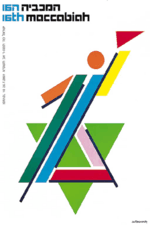2001 Maccabiah Games
| 16th Maccabiah | |||
|---|---|---|---|
 | |||
| Nations participating | 49 | ||
| Debuting countries |
| ||
| Athletes participating | 3,300 | ||
| Events | 38 | ||
| Opening ceremony | July 16, 2001 | ||
| Closing ceremony | July 23, 2001 | ||
| Officially opened by | Keren Leibovitch | ||
| Main venue | Teddy Kollek Stadium | ||
| |||
For the 2001 16th Maccabiah Games (Hebrew: המכביה ה16 ישראל תשס"א), the Opening Ceremony was held in Jerusalem at Teddy Stadium, while the re-building process of the collapsed bridge and investigations into the collapse continued.
It is considered a 'smaller games' for three reasons: attendance was significantly lower, particularly from the Australians (it sent only about 170 athletes, compared with around 400 in 1997); it was run at the height of the Second Intifada (and straight after the infamous Dolphinarium bombing—the largest of the Intifada—that killed 21 Israelis, mostly high school students); and not all wounds had been healed after the collapse of the bridge.
The 16th Maccabiah attracted more than 5,000 athletes from 46 countries.
Over 25,000 people were at the stadium for the opening ceremony. Keren Leibovitch, an Israeli paralympic swimmer who had won three gold medals at the 2000 Paralympics, was given the honor of lighting the torch at the Games at Teddy Stadium in Jerusalem.[1]
Junior futsal and girls' soccer were new sports.
At the opening of the Games on July 16, 2001, Prime Minister Ariel Sharon declared:
"Approximately 2,100 years ago, the Maccabees lit the torch in Modi'in and carried it to the gates of Jerusalem, in the Jewish people's struggle for freedom in its homeland. The same fire of freedom and faith, which was not extinguished during 2,000 years, is, today, passed on to you.... You represent the spirit of the Maccabees who fought for Jerusalem and for Jewish rights and independence 2,167 years ago."
Gold medalist Lenny Krayzelburg of the United States set a new record in the 100-meter backstroke. He also won a gold medal in the 4 X 100M medley relay.[2] Krayzekburg was chosen by the US team to carry their flag at the opening ceremony.[3]
Russian fencers Sergey Sharikov and Maria Mazina won gold medals in men's sabre and women's foil.[2] Vadim Gutzeit of Ukraine, who nine years earlier won an Olympic gold medal in team sabre, won a silver medal in sabre, as he lost to Scharikov. Jonathan Tiomkin of the US, who later was a Pan American Games gold medalist, won silver medals in team foil and team épée.
Participating communities
The number in parentheses indicates the number of participants that community contributed.
Medal count
| Rank | Nation | Gold | Silver | Bronze | Total |
|---|---|---|---|---|---|
| 1 | | 223 | 192 | 159 | 574 |
| 2 | | 34 | 54 | 61 | 149 |
| 3 | | 22 | 15 | 18 | 55 |
External links
Footnotes
- ↑ "The Maccabiah Games history and information". Jewishsports.net. Retrieved July 10, 2011.
- ↑ 2.0 2.1 "The Maccabiah Games history and information". International Jewish Sports Hall of Fame. Retrieved 30 April 2014.
- ↑ Schiff, Brian (August 2, 2001). "Phoenix of the Games". Jewish Journal. Retrieved April 30, 2014.
| |||||||||||||||||||||
